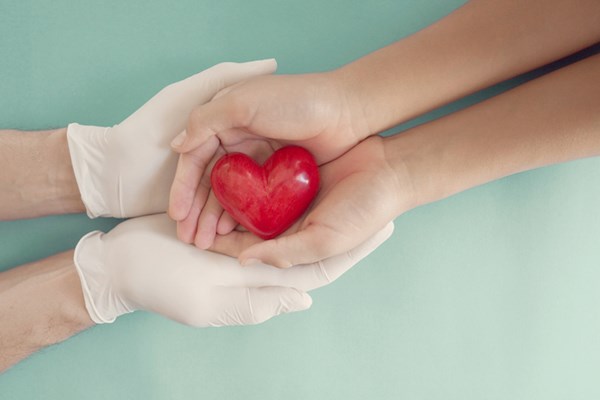It is hard enough to be an intern, let alone an intern in the middle of a global pandemic.
In addition to learning how to diagnose, treat, perform procedures, and identify critically ill patients, we learned how to cope with constantly witnessing the most brutal and honest human experiences: emotional trauma, sadness, pain. And while I might have anticipated this emotional burden, what I didn’t anticipate – or train for – was the resultant feelings of futility.
I was an intern resident physician in Chicago in 2020. My last few months of medical school were full of uncertainty – my canceled ICU rotation, weekly university-wide coronavirus updates, watching the numbers of available hospital beds dwindle nationwide. Like thousands of 2020 graduates, I celebrated 4 years of medical training over Zoom.
Everything changed on July 1, 2020, when I walked into the emergency department for the first time as a physician and immediately entered the fray: My very first patient was COVID positive. The nurse and I donned our yellow disposable gowns, goggles, gloves, orange N95s, and we entered the room. I stumbled through introducing myself – saying “My name is Dr. Halloran and I’ll be one of the people taking care of you today” for the first time, barely convincing myself or the patient.
Every day since then I have seen the heart-wrenching emotional cost of this pandemic and medicine as a whole. A patient with COVID having difficulty getting enough oxygen into her body, listening to her husband tell her he loves her right before I insert a tube into her lungs to help her breathe. The wife of another patient with COVID pulls me aside outside her husband’s room – he has a weak immune system, and she is devastated that her work as a home health nurse might have exposed him to the virus. There are stories of hospital staff treating their own critically ill co-workers. These were daily occurrences, and they have taken their toll on us.
Along with seeing so much sadness these past months, every day I wonder – did I matter? Did I make a difference? Did my work help this patient and their family?
I spend my days providing care, helping where I can, listening to fears and concerns. I become more confident with procedures I never thought I could be as a medical student. I learn so much every day yet still feel that I will never know enough to be competent and confident. During my intensive care unit night shifts I have to pronounce a death for the first time for my patient who had listed her code status as DNR. Her nurse sat with her and held her hand while she died alone in her room as my senior resident and I attended a code across the unit. The nurse and my senior resident help me go through the steps, listening to her now silent heart and lungs, shining a light into her open, unseeing eyes, until it is time to pronounce. We leave her room, and my senior asks how I am doing as I swallow back tears. I go down to the emergency department to see my co-residents, who tell me their stories of their first death exams. I feel understood – they know exactly how I’m feeling, they’ve been here before. I cry in the elevator, then tamp down my sadness and go back to the ICU to call the patient’s husband.
Months later, after work I continue to see people walking outside without masks, I hear my neighbors having another party. During my commute to the hospital one day I catch faint snippets of a stranger's conversation about how "we sure did overreact to this COVID business, didn't we?" A flash of anger stops me in my tracks. I think of our full ICUs and my COVID patient mere hours earlier who needed a ventilator. I think about all of the death I have seen, of the families I have called to tell them their loved one has died. Of the many death exams I have now performed. For another moment I wonder if what I am doing matters.
But I get to the hospital, put on my N95, and I am reminded of the difference we do make. Of the connections that we forge with patients and their families, not only during times of their greatest struggles but also in the quiet moments. It is easy for me to overlook the small differences we make day to day and of the impact we have. Every time I start to lose sight of this meaning, another patient brings it back up to the foreground. An older woman comes to the emergency department for abdominal pain. Our imaging reveals a high likelihood of cancer, so I discuss the findings with her. As we sit together in her room, a small moment of stillness in an otherwise busy emergency department, she tells me about her faith, her husband, and the inner strength that she has.
These moments show me how I feel the most connected to my patients during times of quiet and emotional honesty.
I had been trying to block the ever-growing internal wave of sadness from tragedies witnessed, to bury my feelings in an effort to protect myself, but that effort to protect nearly imprisoned - it left me alone behind an impenetrable wall. How can I connect with patients, empathize with them and their struggles, if I have effectively numbed myself and my emotions?
Through my patients I have learned how to be more open, more empathetic, more understanding. Through these moments of vulnerability, I am reminded that our actions do matter, we do make a difference, and we do not go unnoticed.



